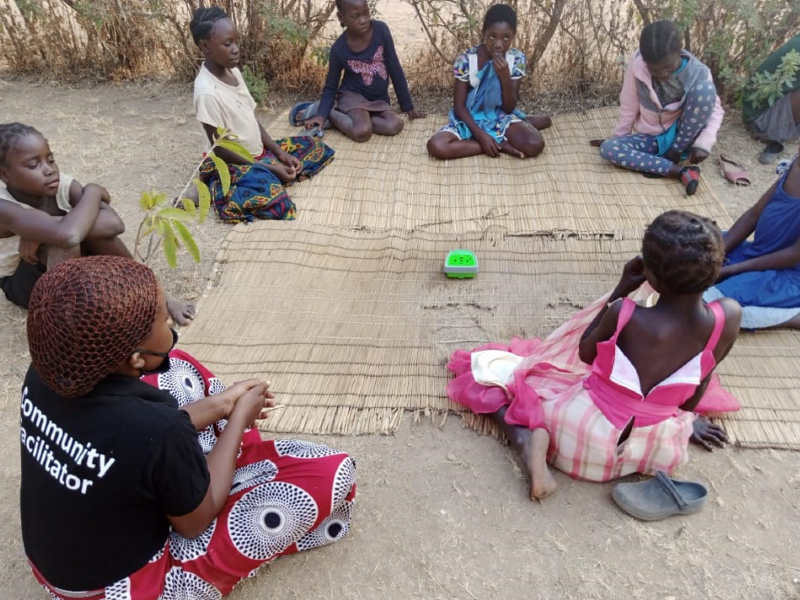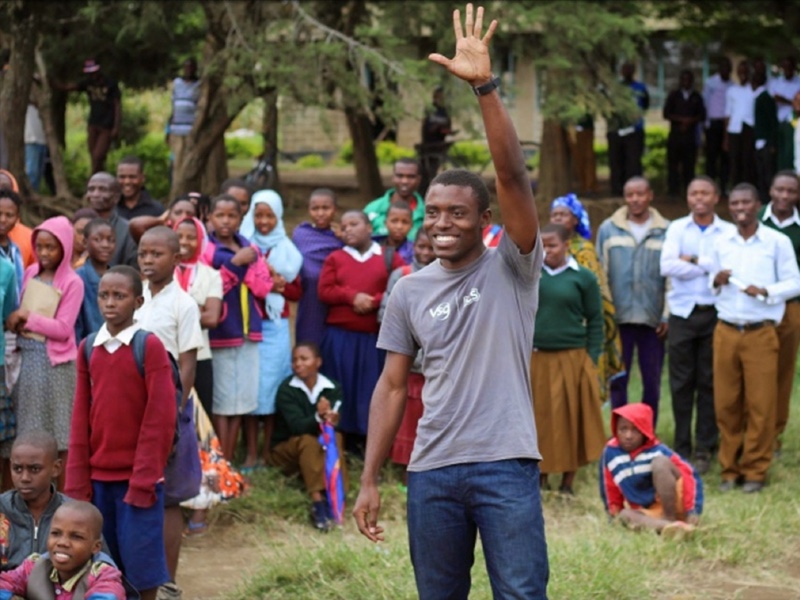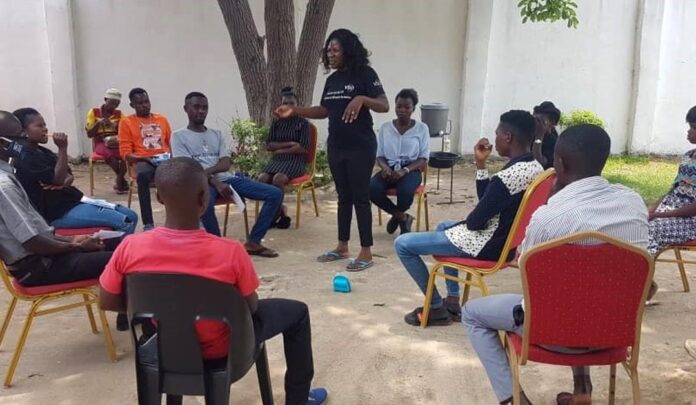By: Erin Inclan
Publisher: Amplio
Date: November 3, 2020
How VSO Zambia is using Talking Books to raise awareness on adolescent sexual and reproductive health and rights
Young people in Zambia face high rates of teen pregnancy and heightened risk of HIV. The situation is more dire in Samfya District, an isolated region of island communities, but talking about sex is taboo. Voluntary Service Overseas (VSO) partnered with the government and Planned Parenthood Association of Zambia to tackle sexual health taboos. Their Adolescent Training and Local Knowledge (TALK) project brings together community volunteers and youth groups to strengthen sexual and reproductive health and rights (SRHR).
In July, VSO Zambia launched TALK II, which adds Talking Books to the mix. The project aims is to inform and empower young people, so they can make healthy decisions for good health and well-being (Sustainable Development Goal 3).
Adolescent sexual and reproductive health challenges
The Zambia government is working to strengthen adolescent sexual health education and services. However, young people continue to face challenges, including low contraceptive use, poor menstrual hygiene management, teen pregnancy, early marriage, STI/HIV infection, and gender-based violence.
Samfya District, Luapula Province, has the second highest rate of child marriage (50%) in the country. HIV prevalence is higher (9%) than the national average (5%). The average age of sexual debut and cultural marriage is 12 years. Children as young as 10 years are engaged in transactional sex, and by 18 years, 53% of girls are married and 30% are pregnant or already mothers.
Communities in Samfya are reliant on small-scale agriculture and transient fishing. Parents are often away, working to grow food and catch fish. Adolescents are on their own for extended periods of time, which puts them at greater risk.

Young participants listen to Talking Book messages about sexual and reproductive health and rights.
Young TALK II participants listen to Talking Book messages about sexual health.
Innovation for sexual and reproductive health and rights
The TALK II project came about when VSO Zambia and Amplio were introduced by Arm, a leading global technology company and longtime Talking Book supporter. Arm’s corporate sustainability approach creates innovative partnerships and technology to achieve the United Nations Sustainable Development Goals.
The project targets adolescents, aged 10–19 years, and will implemented over a 12-month period. VSO distributed Talking Books to 100 youth groups. Each group shares a device. Led by trained community volunteers, the youth meet weekly to listen to Talking Book messages and discuss their experiences. On a rota basis, group members can take a Talking Book home to listen with their families.
VSO Zambia hired a consultant to create culturally-relevant audio content, including songs and dramas. Messages are based on the Ministry of Health’s standard sexual health education materials and recorded in the local language. Every few months, VSO will update Talking Book content and collect usage data and user feedback. This will allow them to monitor engagement, identify issues and trends, and hear directly from youth in their own voices.
A cost-effective approach to behavior change
VSO expects the TALK II project to reach 1,000 adolescents and 8,000 family members in five wards (Kapata, Chimana, Mano, Chishi and Mbabala islands). With the addition of Talking Books, they anticipate the following benefits:
A wider reach: Through household listening, SRHR messaging can be heard by the whole family and not just those who attend the youth groups. Samfya families are typically between 6 and 10 people, so this will mean a significant increase in reach and, more importantly, reach the most marginalized, including women.
Message quality: Previously, community volunteers did not always deliver high quality SRHR information. The use of Talking Books will enable VSO’s community volunteers to deliver consistent, accurate, high quality messaging.
Community feedback: Because Talking Books will allow people to engage with SRHR messages in a less intrusive way, VSO expects this to lead to more open and honest feedback about the project interventions. In addition, stakeholders can use the Talking Book’s built-in microphone to record anonymous feedback.
Data collection: Assessing behavior change campaigns can be difficult. Because Amplio’s technology collects usage statistics and user feedback, VSO will have access to data and insights they can use to evaluate message effectiveness, improve content for future deployments, and create program reports.

VSO Zambia’s TALK II project empowers youth around sexual and reproductive health and rights.
TALK II aims to empower youth around sexual and reproductive health and rights.
Goodbye boredom, hello health during COVID-19
Mavis Banda, a project officer who has led VSO Zambia’s SRHR programming in Samfya for over five years, said Talking Books are already making a difference.
“Our volunteers say it’s easy to tackle sensitive issues, like menstrual hygiene. You can play a message, step away, and leave people to listen,” Banda said. “This is a user-friendly technology for low-literate people. You don’t need to know how to read; it talks to you. Even the navigation is in audio, in the local language.”
In addition, the technology offers a social outlet: “The young people say, ‘Now that Talking Books have come to our community, we won’t be bored any more.’”
When the project was delayed by coronavirus, VSO Zambia took the opportunity to add COVID-19 messages to their Talking Book content. More importantly, the technology has allowed them to run the program, despite school closures.
“Amplio’s technology is very appropriate in the COVID environment,” Banda explained. “At the household level, you don’t have to be there, the Talking Book plays the message. Our volunteers sanitize the device before passing it to the next household. Likewise, at the youth listening groups, participants are seated at least a meter apart, to adhere with Ministry of Health guidelines.”
Access to information is a human right
During a recent partner webinar, Banda emphasized the value of Amplio’s technology for engaging youth, beyond the current pandemic. “Young people are interested in technology, whether they live in rural areas or urban areas, or come from low-literate communities. Youth are very drawn to technology and, if you want to engage them, you meet them at that level,” Banda said.
“This is an appropriate technology for these communities. Talking Books provide a safe space to get accurate information, without judgement. This is an opportunity for us to break some cultural barriers, and to have a conversation. Access to information on sexual and reproductive health is a human right.”
Source: https://www.amplio.org/2020/11/03/innovation-for-sexual-health-education-in-rural-zambia/
Comment: This article is effective at reminding us how to design a product that is usable by an assortment of individuals. The concept of Talking Books in this article is great, because this design has the ability to communicate clearly and concisely with people who may be struggling with literacy. Its important for us to remain diligent and push our work to a point where it is an accessible technology or innovation in the Sex Ed field.





I think talking book is an excellent idea not only because it’s accessible, but it also takes sex education out of the classroom setting and into the families. It provides rooms to step back from the group without missing the message. And when it serves as an education tool in the family, it also creates a platform for the parents to discuss sex openly with their children, which has been a huge concern. Allowing participants to record annoymous messages and constantly update the content base on the feedback is also very effective. I wonder what kind of conflicts they’ve run into when distributing the device and introduce the course?
I echo Sherry’s comments about leveraging this as a tool for parent-child conversations in addition to the community group. Additionally, something else I found interesting was the comment that Talking Books allowed for more consistency in messaging instead of possible mixed messages from teachers. I think this is an interesting point because a big part of sex education is how the information is delivered. If teachers are not properly trained then students can get mixed messages. This type of intervention offers a way to bypass that, ensuring the content stays consistent and relevant and I think that’s something important to keep in mind moving forward!